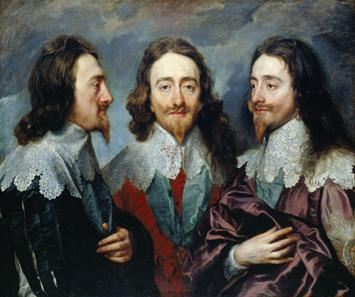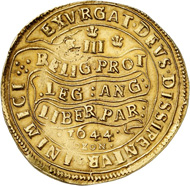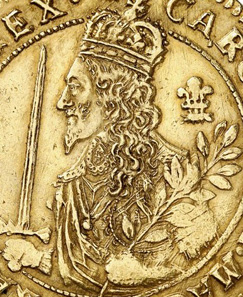The situation was too tempting: Germany was already in the middle of the Thirty-Years-War, when Charles I was made King of England, Scotland, France and Ireland on March 27, 1625. Surely there was something to gain! In those days most European powers tried to win territories from the Holy Roman Empire.
Charles I of England, painting by Anthony Van Dyck around 1635.
Charles wanted to take part in this endeavour as well. Unfortunately though, the young king did not have enough money, as the English parliament was in charge of approving taxes at the time. And parliament was not interested in blowing money on foreign wars. Consequently, they did not give him access to large sums. Usually the king would receive the profitable tolls for harbours at the beginning of his reign but parliament only gave Charles access to these tolls for a year – a rather unfriendly gesture. And it would not be the only one.
When Charles summoned parliament in the year 1628, members were only willing to pay taxes if the king would adhere to the following four regulations:
1.) The use of martial law should be restricted.
2.) No citizen should be executed without a legal trial.
3.) Billeting of soldiers should be abolished.
4.) All taxes and dues would have to be authorised by parliament exclusively. If anyone would react against an unauthorised tax, they could not be prosecuted.
Depiction of the English parliament from the 16th century.
The last point was crucial. It made the king dependent on his parliament. Charles signed the petition anyway. Parliament approved the funds. And then the king did what he wanted and simply did not summon parliament anymore afterwards. More than 10 years went by. It was only when the Scots declared war on him that Charles had to bite the bullet once more. He needed more money. But it was not that simple …
The first problem was that many members of parliament, mostly land owners from the country, sympathised with the Scots. They were fighting a war because they did not want to give up their Presbyterian faith for the Anglican Church. Let’s not forget that Germany was at war for the same reason. Subjects were simply no longer willing to sacrifice their freedom of conscience to the royal aspirations to a state religion. And this also applied to English members of parliament, many of which belonged to non-Anglican denominations.
The fact that parliamentarians also wanted to have a determining influence on politics which were financed by their money, turned the matter into an explosive situation.
Charles I. Triple unit 1644, Oxford. Very rare. Almost extremely fine. Estimate: 50,000,- euros. From Künker auction 310 (June 21, 2018), No. 6144.
How did Charles think about the matter? It is shown by the obverse of a coin which was minted in Oxford in 1644, to finance the war against the Puritans. It reads (in translation) “Charles, by the grace of God, King of Great Britain, France and Ireland”. By the grace of God, mind you! No word about a parliament. The King is the mediator between God and his subjects. And that is why Charles is depicted with the splendour of his crown. He is holding the executioner’s sword, to punish all those who did not adhere to his law.
Parliament doubted this divine grace. And they were scared. After all, Charles had military command and he even wanted to enlarge his army because of the Scottish threat. As commander-in-chief it would have been all too easy for him to get the idea of proceeding against parliament. This fear fuelled a resistance and when Charles actually ordered the arrest of one of the worst agitators on January 4, 1642, parliament mobilised the people of London. They turned against their king. He had to flee.
Above the roofs of Oxford. Photo by David Iliff. Liscence: CC-BY-SA 3.0.
He made himself at home in Oxford and already founded a new mint in January of 1642. After all, he needed coins to pay the soldiers who should fight for the king. The mint was at the New Inn Hall, where St. Peter’s College is located today. Thomas Bushell and Sir William Pankhurst were appointed mint masters. They had managed the Shrewsbury and Tower Mint before the uprising. They had large amounts of silver and gold at their disposal – at least in the beginning – as all colleges had kept their saved money by fashioning wonderful vessels from the redundant silver and gold. These vessels, which had been used to display the college’s wealth during banquets, were now taken and thrown into the melting pot.
Detail of lot 6144.
During the initial phase of the civil war, the royal armed forces were quite successful and so everything was still up in the air when this coin was minted in 1644. Nevertheless the king still explicitly expresses his desire for peace. He is holding an olive branch in his left hand as a symbol for peace.
Detail of lot 6144.
And he used the reverse to sum up his alleged principles: the Protestant religion, the laws of England and the freedom of parliament. In this case, the Protestant religion meant the Anglican Church of course, which Charles hoped to install as state church. The laws of England were royal laws and freedom of parliament would have been freedom from the grace of Charles.
The inscription on the reverse is taken from the Bible. Psalm 68, verse 2 is a threat to the enemies: Let the wicked perish in the presence of God.
But his opponents also claimed to have God’s support and they were much more successful than Charles. After the execution of King Charles I, Cromwell issued coins in the year 1649 and depicted himself as defender of the Republic of England, Scotland and Spain by the grace of God (!).
Whether the Anglican or the Puritan God actually wanted a civil war which cost countless lives – we have reason to doubt it today.
CoinsWeekly has published a detailed auction preview about this sale. For having a look at the text featuring many pictures click here, if you are short of time, you might prefer the Künker preview in films.










